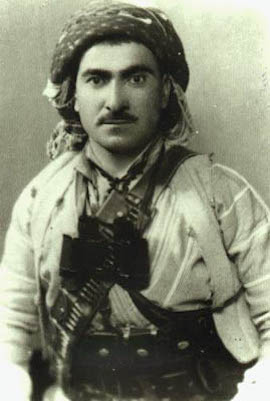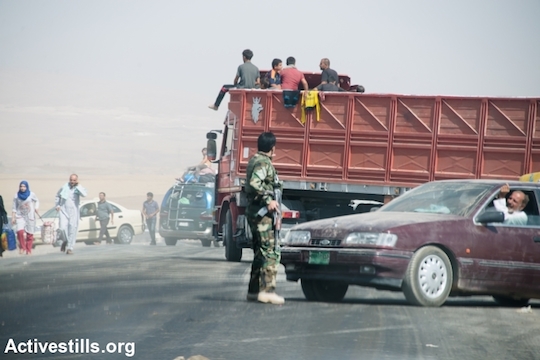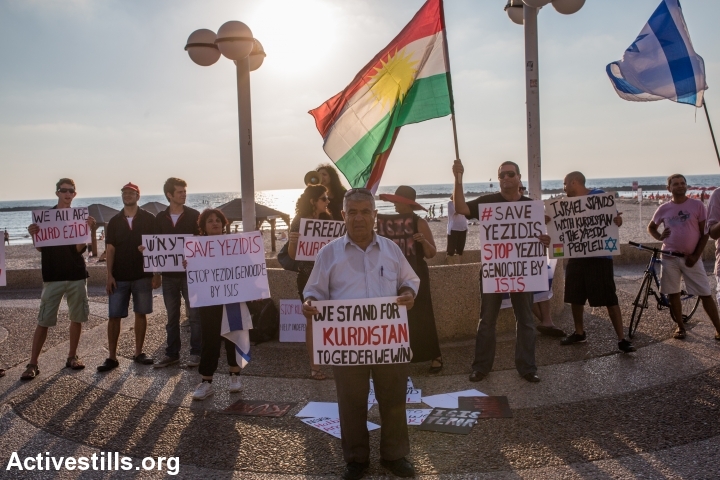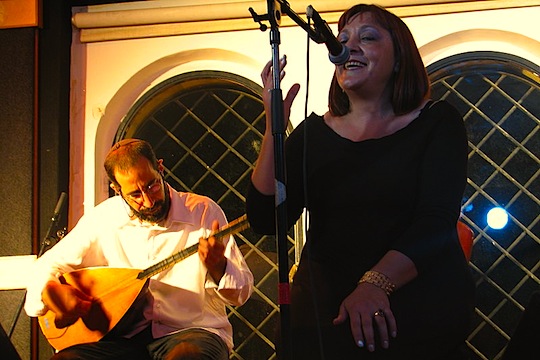The Yezidis are presented in mainstream accounts as mere props in a play entitled, ‘Militant Islam and its horrors in the Middle East.’ But the story of the Kurdish people is much more than just a scene — or cannon fodder — in an IS exhibition of horror. A Kurdish Jew in Israel calls on her government to save her brethren.
By Idan Pink-Avidani
Kurds have no friends but the mountains..
Dear friends and whoever is reading this. Please stop posting negative news and instead pray for #Peshmarga and have faith in God. We Kurds never harmed any nation and never asked for something which was not our right. We only struggle for our own rights, we only fought to protect our children and women. We never had support from anyone. Not any nation. Let’s all pray and ask God to protect us and our Peshmarga. Let’s stop acting like we know what’s going on coz we simply don’t. Let’s stop acting like politicians and analyze and post things on Facebook. Instead let’s stay humans and pray. Let’s stay humans and help our families in Shangal who fled away from their home. Let’s simply look up there to the sky and ask HIM for peace. He never rejects a request.
We are a peaceful nation, who opened it’s arms to protect those who never made a small effort to support us, because KURDS are humans. Let’s stay humans.
You are not helping by making people terrified.
#pray #for #peshmarga”
The text above is what my friend Huda from Irbil-Hawler, the capital of the autonomous Kurdistan region, wrote on her Facebook page a few weeks ago following another deadly attack by Islamic State (IS) forces. The attack caused hundreds of thousands of Yezidis to flee to the mountains where many of them died of hunger and thirst while praying to be rescued.
To me, this moving text represents the essence of the Kurdish people and their struggle for independence: solidarity in a shared destiny that transcends internal political disputes, a strong desire for faith and utter distrust in anyone but themselves.
Since IS entered our consciousness and lives in the Middle East, most people found themselves following and viewing the atrocities this horrific organization is committing through the eyes and explanations of professional media commentators who analyze the situation in Iraq from a distant security perspective. In this analysis the Kurds are presented as props in a play entitled “Militant Islamic violence and its horrors in the Middle East”; however, most of us don’t really understand what is going on or know that the story of the Kurdish people is much more than just part of a scene — or cannon fodder — in an IS exhibition of horror. It is also much more relevant to us Israelis – people of the Jewish nation living with certain independence in Zion.
The phrase “Kurds have no friends but the mountains” was coined by Mullah Mustafa Barzani, the great and undisputed leader of the Kurdish people who fought all his life for Kurdish independence, and who was the first leader of the Kurdish autonomous region. His son, Massoud Barzani, is the current president of Iraqi Kurdistan. Other family members hold key positions in the government.

Kurdistan is a mountainous region, fertile and beautiful. Due to the terrain, the Kurdish people lived in relative detachment from the rest of the Middle East for many years and managed to preserve ancient cultures that had disappeared from the world. The Yazidi minority we hear about in the news is not the only Kurdish minority. The Jews of Kurdistan, for example, maintained the traditions of ancient Judaism from the days of the Babylonian exile and the First Temple: they carried on the tradition of teaching the Oral Torah, and Aramaic remained the principal tongue of some in the Jewish Kurdish community since the Talmudic period. They preserved the legacy of the last prophets — whose grave markers constituted a significant part of community life — including the tomb of the prophet Jonah in Mosul, the prophet Nahum in Elkosh and the prophet Daniel in Kirkuk. When the vast majority of Kurdish Jews immigrated to Israel and adopted Hebrew as their first language, Aramaic ceased to exist as a living, spoken language. Although our grandparents’ generation still speaks it, along with a few Christian communities in Kurdistan, Aramaic has been declared a dead language by the academic world.
It seems as if the Kurds have always been persecuted by other nations and lived under foreign occupation. Despite urbanization, the mountains were — and remain — a safe zone for the Kurdish people. The Kurdish resistance movement grew out of the mountains and its fighters are still the only ones who can survive and fight in the tough terrain. In the last century the Kurds of northern Iraq lived under Iraqi-Arab occupation. During Saddam Hussein’s rule, thousands of Kurds were slaughtered and entire towns and villages were razed to the ground. I remember my grandparents following the news in Kurdistan at the time with great concern, all while the eyes of the world were focused on Baghdad, oil and imperialism.
The Jewish Kurdish community has always been close-knit, and like other ethnic communities that were thrown into the Zionist melting pot, previous cultural relations with its neighbors were cut off. As a second-generation Israeli born to Kurdish immigrants, when I started to initiate contact with fellow Kurds in Kurdistan I was surprised to discover how similar we were. I had expected a certain degree of disapproval over the mere fact that I was Jewish, out of solidarity with their Muslim brothers in Palestine, but I found that for the Kurdish people national identity is a thousand times more important than religious affiliation. Although most of the Kurds in the world are Sunni Muslims, for them I was first and foremost Kurdish; being Muslim, Christian, Jewish or Yazidi came second.
By simply familiarizing myself with non-Jewish Kurds I found that I could better understand the culture of my ancestors. I also realized the heavy price that each of us had paid over the last 60 years on different sides of the Middle East: we, the Kurdish Jews, managed to gain a certain level of security and independence while realizing the fundamental right of self-determination. But it came at a high price: giving up a culture that we had managed to maintain for thousands of years. Three-thousand-year-old traditions were lost in the Israeli melting pot and in the creation of a new Israeli identity. Of the 200,000 Jewish Kurds that live in Israel today, the vast majority do not speak Aramaic or Karmanji. In some of the synagogues prayers are sung in a Kurdish style; at some Kurdish weddings people dance with the dohulh and zurna instruments; and many still eat kubea on Fridays. But this magnificent culture is now largely framed as history or folklore.
In contrast, the Kurds in Kurdistan have preserved their culture but paid a heavy price in the form of years of suffering, genocide and atrocities that we (thankfully) never had to experience. They told me of the great escape to the mountains in the 1990s, the total destruction of towns and villages, the fear of Saddam Hussein’s chemical weapons and the humanitarian aid parachuted to them from planes so they could survive. I particularly remember the description of aid packages with flour that fell apart before landing on the ground, and anxious Kurds stared at the white powder, sure that it was a chemical weapon about to destroy them, like the chemicals that had already killed so many Kurds.
Even after all these horrors the world is not yet convinced that the Kurds deserve independence. We are already familiar with the hypocrisy of the Western world, but why is there no one in the Middle East who comes to the Kurds’ defense? The simple answer is that they are not Arabs. The more complex answer is based on geo-political interests. When we talk about Kurdistan we generally refer to southern Turkey, northeast Syria, northern Iraq and western Iran. None of these countries is willing to give up their territory for the sake of Kurdish independence, especially considering that in some cases the land in question consist of major reserves of oil and other valuable natural resources.
While the world remains silent in face of the horrors occurring in Kurdistan today, just as it kept silent during the genocide perpetrated by Saddam Hussein, my Facebook feed is full of photos of vigils and support protests organized by Kurds living outside of Kurdistan.
While the Arab League is committed (at least on paper) to Palestinian independence, it continues to oppose Kurdish independence. Kurdistan’s strongest ally is the U.S. It was the U.S. that helped establish Kurdish autonomy after the fall of Saddam Hussein and is now offering limited assistance – mainly in the form of humanitarian aid and limited air strikes against IS military targets.

But with all due respect to the desire not get involved in yet another foreign policy mess and war that is not their own, the U.S. cannot disregard its direct responsibility for the disaster that is transpiring in the region. It was the U.S. that armed the Iraqi army, which later abandoned its positions and allowed IS to get their hands on more advanced weaponry than that of the Kurdish Peshmerga, who were forbidden from arming themselves. The “leader of the free world” went to war without hesitation hundreds of thousands of miles from home in order to protect oil interests over a decade ago, and now that this decision is resulting in genocide it is cautious and ready to defend only American consular institutions in Irbil. There is no end to hypocrisy.
But we are not citizens of the U.S. We are citizens of Israel and members of the Jewish people. We must not avert our eyes away from a persecuted minority that is undergoing genocide; we must not forget that, as Jews, we survived genocide very recently. Since the establishment of the State of Israel, the Kurds remain the largest minority in the world without a state of their own. Kurdistan is not on the other side of the world; it’s a two-hour flight from Tel Aviv – much closer than the Far East, where we did not hesitate to help victims of the tsunami disaster. It is far closer than Haiti, Kenya and other places where Israel has invested great resources to help people there. The State of Israel, which is careful not to interfere in Syria for fear of diplomatic entanglement must not fear getting caught up in Kurdistan. There is no concern of agitating the Arab League, as it doesn’t support Kurdish independence. There is no fear of getting into trouble with Turkey, since our relations have never been worse. And there is clearly no worry that we’ll annoy the U.S.
The common Israeli ignorance about what is happening in the Middle East, and the general sentiment that “the whole world, especially the Middle East, is against us,” causes us all to miss the similarities between the Jewish and Kurdish peoples. For Kurds living in Israel it is very clear: for years they lived under Iraqi occupation, and if you ask them they will tell you that the mass immigration in 1951-52 was not spurred by Muslim Kurds, but by the Iraqis.
[Destruction of the Prophet Jonah’s tomb in Mosul]
Many do not know that the Kurdish community in Israel, just like other Kurdish communities in exile, is still in touch with Kurdistan. When Mullah Mustafa Barzani led the persistent Kurdish struggle for independence, the whole world saw the fighters as an illegitimate guerrilla organization. The enlightened Western world viewed Kurdish independence as a threat to its political and economic interests in the Middle East.
The late Haviv Shimoni, who founded the National Association of Kurdish Jews in Israel, held a close personal relationship with Barzani and made sure that Israel helped the Kurds in their struggle for independence. Today his nephew, Yehuda Ben-Yosef, is the chairman of the organization and continues working to promote solidarity with the Kurds.

Like other Kurds in exile, we recently held a vigil in front of the American embassy in Tel Aviv. We demanded that the U.S. do more than offer targeted humanitarian assistance. With today’s forms of social media the horrific videos of executions by extremist groups are delivered to us almost live. With them we also witness our cultural heritage being erased. I watched the destruction of the tomb of the Prophet Jonah in Mosul in horror, and slowly the understanding dawned that we are dealing with people who have lost their humanity and are out to destroy an entire people and their culture.
Now it is our time to turn to the Israeli government. As ordinary citizens we raised a voice, but it’s not enough. I call on our prime minister, foreign minister and defense minister: this is not the time for diplomatic discussion but for action. It’s time to take control and immediately respond to IS and the threat to Kurdistan, which is a threat to us, our cultural heritage and the non-Arab minority in the Middle East. We never forgave the world for its hesitation when it chose not to bomb the gas chambers of Auschwitz. Now it’s our turn; we must not hesitate. We have the means, we have the ability and we have a moral obligation not to stand idly by.
This post was first published in Hebrew on Haokets. Idan Pink-Avidani is an Israeli educational tour guide and social activist.


